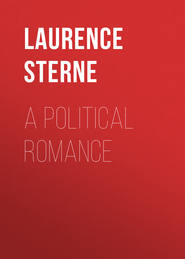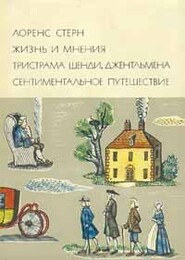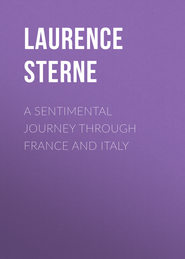По всем вопросам обращайтесь на: info@litportal.ru
(©) 2003-2025.
✖
The Life and Opinions of Tristram Shandy, Gentleman
Настройки чтения
Размер шрифта
Высота строк
Поля
I was but ten years old when this happened: but whether it was, that the action itself was more in unison to my nerves at that age of pity, which instantly set my whole frame into one vibration of most pleasurable sensation;—or how far the manner and expression of it might go towards it;—or in what degree, or by what secret magick,—a tone of voice and harmony of movement, attuned by mercy, might find a passage to my heart, I know not;—this I know, that the lesson of universal good-will then taught and imprinted by my uncle Toby, has never since been worn out of my mind: And tho' I would not depreciate what the study of the Literae humaniores, at the university, have done for me in that respect, or discredit the other helps of an expensive education bestowed upon me, both at home and abroad since;—yet I often think that I owe one half of my philanthropy to that one accidental impression.
This is to serve for parents and governors instead of a whole volume upon the subject.
I could not give the reader this stroke in my uncle Toby's picture, by the instrument with which I drew the other parts of it,—that taking in no more than the mere Hobby-Horsical likeness:—this is a part of his moral character. My father, in this patient endurance of wrongs, which I mention, was very different, as the reader must long ago have noted; he had a much more acute and quick sensibility of nature, attended with a little soreness of temper; tho' this never transported him to any thing which looked like malignancy:—yet in the little rubs and vexations of life, 'twas apt to shew itself in a drollish and witty kind of peevishness:—He was, however, frank and generous in his nature;—at all times open to conviction; and in the little ebullitions of this subacid humour towards others, but particularly towards my uncle Toby, whom he truly loved:—he would feel more pain, ten times told (except in the affair of my aunt Dinah, or where an hypothesis was concerned) than what he ever gave.
The characters of the two brothers, in this view of them, reflected light upon each other, and appeared with great advantage in this affair which arose about Stevinus.
I need not tell the reader, if he keeps a Hobby-Horse,—that a man's Hobby-Horse is as tender a part as he has about him; and that these unprovoked strokes at my uncle Toby's could not be unfelt by him.—No:—as I said above, my uncle Toby did feel them, and very sensibly too.
Pray, Sir, what said he?—How did he behave?—O, Sir!—it was great: For as soon as my father had done insulting his Hobby-Horse,—he turned his head without the least emotion, from Dr. Slop, to whom he was addressing his discourse, and looking up into my father's face, with a countenance spread over with so much good-nature;—so placid;—so fraternal;—so inexpressibly tender towards him:—it penetrated my father to his heart: He rose up hastily from his chair, and seizing hold of both my uncle Toby's hands as he spoke:—Brother Toby, said he:—I beg thy pardon;—forgive, I pray thee, this rash humour which my mother gave me.—My dear, dear brother, answered my uncle Toby, rising up by my father's help, say no more about it;—you are heartily welcome, had it been ten times as much, brother. But 'tis ungenerous, replied my father, to hurt any man;—a brother worse;—but to hurt a brother of such gentle manners,—so unprovoking,—and so unresenting;—'tis base:—By Heaven, 'tis cowardly.—You are heartily welcome, brother, quoth my uncle Toby,—had it been fifty times as much.—Besides, what have I to do, my dear Toby, cried my father, either with your amusements or your pleasures, unless it was in my power (which it is not) to increase their measure?
–Brother Shandy, answered my uncle Toby, looking wistfully in his face,—you are much mistaken in this point:—for you do increase my pleasure very much, in begetting children for the Shandy family at your time of life.—But, by that, Sir, quoth Dr. Slop, Mr. Shandy increases his own.—Not a jot, quoth my father.
Chapter 1.XXXVIII
My brother does it, quoth my uncle Toby, out of principle.—In a family way, I suppose, quoth Dr. Slop.—Pshaw!—said my father,—'tis not worth talking of.
Chapter 1.XXXIX
At the end of the last chapter, my father and my uncle Toby were left both standing, like Brutus and Cassius, at the close of the scene, making up their accounts.
As my father spoke the three last words,—he sat down;—my uncle Toby exactly followed his example, only, that before he took his chair, he rung the bell, to order Corporal Trim, who was in waiting, to step home for Stevinus:—my uncle Toby's house being no farther off than the opposite side of the way.
Some men would have dropped the subject of Stevinus;—but my uncle Toby had no resentment in his heart, and he went on with the subject, to shew my father that he had none.
Your sudden appearance, Dr. Slop, quoth my uncle, resuming the discourse, instantly brought Stevinus into my head. (My father, you may be sure, did not offer to lay any more wagers upon Stevinus's head.)—Because, continued my uncle Toby, the celebrated sailing chariot, which belonged to Prince Maurice, and was of such wonderful contrivance and velocity, as to carry half a dozen people thirty German miles, in I don't know how few minutes,—was invented by Stevinus, that great mathematician and engineer.
You might have spared your servant the trouble, quoth Dr. Slop (as the fellow is lame) of going for Stevinus's account of it, because in my return from Leyden thro' the Hague, I walked as far as Schevling, which is two long miles, on purpose to take a view of it.
That's nothing, replied my uncle Toby, to what the learned Peireskius did, who walked a matter of five hundred miles, reckoning from Paris to Schevling, and from Schevling to Paris back again, in order to see it, and nothing else.
Some men cannot bear to be out-gone.
The more fool Peireskius, replied Dr. Slop. But mark, 'twas out of no contempt of Peireskius at all;—but that Peireskius's indefatigable labour in trudging so far on foot, out of love for the sciences, reduced the exploit of Dr. Slop, in that affair, to nothing:—the more fool Peireskius, said he again.—Why so?—replied my father, taking his brother's part, not only to make reparation as fast as he could for the insult he had given him, which sat still upon my father's mind;—but partly, that my father began really to interest himself in the discourse.—Why so?—said he. Why is Peireskius, or any man else, to be abused for an appetite for that, or any other morsel of sound knowledge: For notwithstanding I know nothing of the chariot in question, continued he, the inventor of it must have had a very mechanical head; and tho' I cannot guess upon what principles of philosophy he has atchieved it;—yet certainly his machine has been constructed upon solid ones, be they what they will, or it could not have answered at the rate my brother mentions.
It answered, replied my uncle Toby, as well, if not better; for, as Peireskius elegantly expresses it, speaking of the velocity of its motion, Tam citus erat, quam erat ventus; which, unless I have forgot my Latin, is, that it was as swift as the wind itself.
But pray, Dr. Slop, quoth my father, interrupting my uncle (tho' not without begging pardon for it at the same time) upon what principles was this self-same chariot set a-going?—Upon very pretty principles to be sure, replied Dr. Slop:—And I have often wondered, continued he, evading the question, why none of our gentry, who live upon large plains like this of ours,—(especially they whose wives are not past child-bearing) attempt nothing of this kind; for it would not only be infinitely expeditious upon sudden calls, to which the sex is subject,—if the wind only served,—but would be excellent good husbandry to make use of the winds, which cost nothing, and which eat nothing, rather than horses, which (the devil take 'em) both cost and eat a great deal.
For that very reason, replied my father, 'Because they cost nothing, and because they eat nothing,'—the scheme is bad;—it is the consumption of our products, as well as the manufactures of them, which gives bread to the hungry, circulates trade,—brings in money, and supports the value of our lands;—and tho', I own, if I was a Prince, I would generously recompense the scientifick head which brought forth such contrivances;—yet I would as peremptorily suppress the use of them.
My father here had got into his element,—and was going on as prosperously with his dissertation upon trade, as my uncle Toby had before, upon his of fortification;—but to the loss of much sound knowledge, the destinies in the morning had decreed that no dissertation of any kind should be spun by my father that day,—for as he opened his mouth to begin the next sentence,
Chapter 1.XL
In popped Corporal Trim with Stevinus:—But 'twas too late,—all the discourse had been exhausted without him, and was running into a new channel.
–You may take the book home again, Trim, said my uncle Toby, nodding to him.
But prithee, Corporal, quoth my father, drolling,—look first into it, and see if thou canst spy aught of a sailing chariot in it.
Corporal Trim, by being in the service, had learned to obey,—and not to remonstrate,—so taking the book to a side-table, and running over the leaves; An' please your Honour, said Trim, I can see no such thing;—however, continued the Corporal, drolling a little in his turn, I'll make sure work of it, an' please your Honour;—so taking hold of the two covers of the book, one in each hand, and letting the leaves fall down as he bent the covers back, he gave the book a good sound shake.
There is something falling out, however, said Trim, an' please your Honour;—but it is not a chariot, or any thing like one:—Prithee, Corporal, said my father, smiling, what is it then?—I think, answered Trim, stooping to take it up,—'tis more like a sermon,—for it begins with a text of scripture, and the chapter and verse;—and then goes on, not as a chariot, but like a sermon directly.
The company smiled.
I cannot conceive how it is possible, quoth my uncle Toby, for such a thing as a sermon to have got into my Stevinus.
I think 'tis a sermon, replied Trim:—but if it please your Honours, as it is a fair hand, I will read you a page;—for Trim, you must know, loved to hear himself read almost as well as talk.
I have ever a strong propensity, said my father, to look into things which cross my way, by such strange fatalities as these;—and as we have nothing better to do, at least till Obadiah gets back, I shall be obliged to you, brother, if Dr. Slop has no objection to it, to order the Corporal to give us a page or two of it,—if he is as able to do it, as he seems willing. An' please your honour, quoth Trim, I officiated two whole campaigns, in Flanders, as clerk to the chaplain of the regiment.—He can read it, quoth my uncle Toby, as well as I can.—Trim, I assure you, was the best scholar in my company, and should have had the next halberd, but for the poor fellow's misfortune. Corporal Trim laid his hand upon his heart, and made an humble bow to his master; then laying down his hat upon the floor, and taking up the sermon in his left hand, in order to have his right at liberty,—he advanced, nothing doubting, into the middle of the room, where he could best see, and be best seen by his audience.
Chapter 1.XLI
—If you have any objection,—said my father, addressing himself to Dr. Slop. Not in the least, replied Dr. Slop;—for it does not appear on which side of the question it is wrote,—it may be a composition of a divine of our church, as well as yours,—so that we run equal risques.—'Tis wrote upon neither side, quoth Trim, for 'tis only upon Conscience, an' please your Honours.
Trim's reason put his audience into good humour,—all but Dr. Slop, who turning his head about towards Trim, looked a little angry.
Begin, Trim,—and read distinctly, quoth my father.—I will, an' please your Honour, replied the Corporal, making a bow, and bespeaking attention with a slight movement of his right hand.
Chapter 1.XLII
—But before the Corporal begins, I must first give you a description of his attitude;—otherwise he will naturally stand represented, by your imagination, in an uneasy posture,—stiff,—perpendicular,—dividing the weight of his body equally upon both legs;—his eye fixed, as if on duty;—his look determined,—clenching the sermon in his left hand, like his firelock.—In a word, you would be apt to paint Trim, as if he was standing in his platoon ready for action,—His attitude was as unlike all this as you can conceive.
He stood before them with his body swayed, and bent forwards just so far, as to make an angle of 85 degrees and a half upon the plain of the horizon;—which sound orators, to whom I address this, know very well to be the true persuasive angle of incidence;—in any other angle you may talk and preach;—'tis certain;—and it is done every day;—but with what effect,—I leave the world to judge!
The necessity of this precise angle of 85 degrees and a half to a mathematical exactness,—does it not shew us, by the way, how the arts and sciences mutually befriend each other?
How the duce Corporal Trim, who knew not so much as an acute angle from an obtuse one, came to hit it so exactly;—or whether it was chance or nature, or good sense or imitation, &c. shall be commented upon in that part of the cyclopaedia of arts and sciences, where the instrumental parts of the eloquence of the senate, the pulpit, and the bar, the coffee-house, the bed-chamber, and fire-side, fall under consideration.
He stood,—for I repeat it, to take the picture of him in at one view, with his body swayed, and somewhat bent forwards,—his right leg from under him, sustaining seven-eighths of his whole weight,—the foot of his left leg, the defect of which was no disadvantage to his attitude, advanced a little,—not laterally, nor forwards, but in a line betwixt them;—his knee bent, but that not violently,—but so as to fall within the limits of the line of beauty;—and I add, of the line of science too;—for consider, it had one eighth part of his body to bear up;—so that in this case the position of the leg is determined,—because the foot could be no farther advanced, or the knee more bent, than what would allow him, mechanically to receive an eighth part of his whole weight under it, and to carry it too.
>This I recommend to painters;—need I add,—to orators!—I think not; for unless they practise it,—they must fall upon their noses.
So much for Corporal Trim's body and legs.—He held the sermon loosely, not carelessly, in his left hand, raised something above his stomach, and detached a little from his breast;—his right arm falling negligently by his side, as nature and the laws of gravity ordered it,—but with the palm of it open and turned towards his audience, ready to aid the sentiment in case it stood in need.
Corporal Trim's eyes and the muscles of his face were in full harmony with the other parts of him;—he looked frank,—unconstrained,– something assured,—but not bordering upon assurance.
Let not the critic ask how Corporal Trim could come by all this.—I've told him it should be explained;—but so he stood before my father, my uncle Toby, and Dr. Slop,—so swayed his body, so contrasted his limbs, and with such an oratorical sweep throughout the whole figure,—a statuary might have modelled from it;—nay, I doubt whether the oldest Fellow of a College,—or the Hebrew Professor himself, could have much mended it.
Trim made a bow, and read as follows:
The Sermon.
Hebrews xiii. 18.
–For we trust we have a good Conscience.











